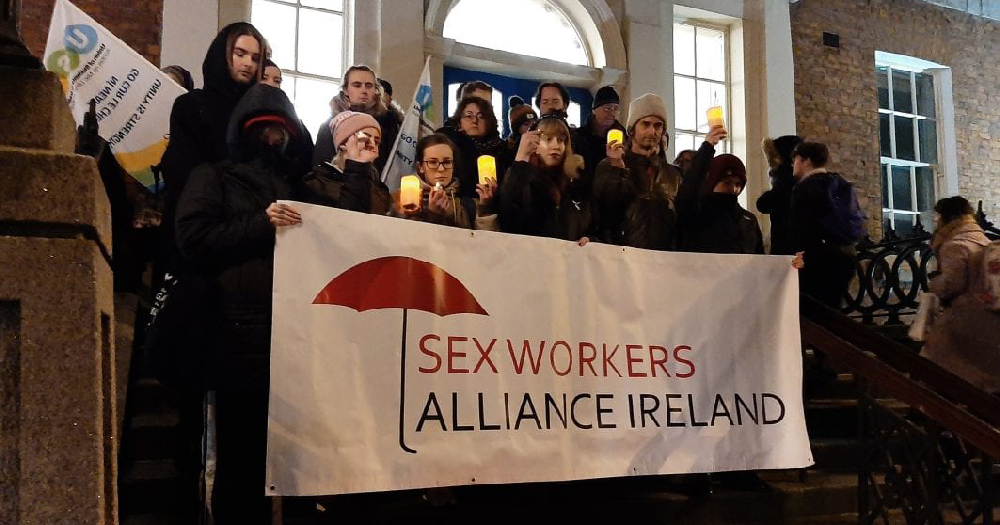Many workers have been hard hit by Covid-19, but for queer sex workers, the problems of the pandemic are compounded by the existing stigma and the problematic legislation governing the industry. Sex-Workers Alliance Ireland (SWAI) have been supporting sex workers to navigate this environment before and during the pandemic while advocating for legislative and social change.
Under the Sexual Offenses Act of 2017, Ireland criminalises the purchase, but not the sale, of sex. Though sex workers are not directly criminalised by this legislation, many face adverse effects including disruptive policing methods and less freedom to choose clients and set fair prices.
According to SWAI, the quasi-legal status of sex work in Ireland has also meant that many workers are unable to access supports such as the pandemic unemployment payment, even though the sex industry has been massively disrupted by Covid.
This is what happened in Ireland.
Better clients were scared away and those that thought they were already breaking the law remained, pressuring workers into lowering prices and engaging in acts they would have previously disagreed to such as unprotected sex.#decrimforsafety https://t.co/1BnqZjvpzL
— Dr Adeline Berry ?️⚧️?? (@adeline_whitney) March 16, 2021
Alongside these challenges, LGBTQ+ sex workers are facing additional layers of stigmatisation and marginalisation. Talking to GCN, SWAI coordinator Kate McGrew explained that conversations on sex work often focus on the experience of cis, female workers.
“Trans and cis, gay male sex workers often get left out of the conversation about sex work, which is very frustrating because they make up a significant portion of sex workers . . . we all have similar kinds of struggles and concerns, but different demographics of people have their own issues that they deal with”
“Trans people have this whole added layer of stigma and they can deal with people at work who are potentially doing more verbal harassment, and even violence; levels of violence are higher amongst trans workers. So, the stigma that comes with sex work is heightened when you’re dealing with potentially transphobic people or people who have internalised homophobia.”
These intersectional issues are further exasperated for migrant workers. McGrew explained, “There’s a lot of crossover between people that are undocumented and trans people, and then they have this added layer of not wanting to reach out for support because they can’t be promised that there’s a firewall between them and immigration.”
As McGrew highlights, when queer workers are left out of the conversation it can be harder for the movement to address these specific issues and offer support to more marginalised sub-groups. She explained that one of the reasons queer sex workers may be isolated from the broader movement is because societal narratives of trans people and cis gay men are very different from that of cis women.
“There is this idea that we hear from these anti-sex work advocates that the men can take care of themselves, the men are working with more agency, the men have higher sex drives anyways, and all of this nonsense, that just makes it more difficult for us to have a unified sex work movement, and for us to have good communication amongst what ends up being pockets of people that are very disparate.”
While highlighting the scale of the issues being faced, McGrew argued it’s also important to discuss positive experiences of sex work. “We spend so much time agitating against the criminal legislation that we suffer under, that we get cornered into having to only talk about harm reduction, and crime and safety, and it leaves no room for people to talk about any kind of value that’s in the work.”
McGrew said that in her experience, more positive discussions of sex work often come from LGBTQ+ people in the industry, perhaps because queer sex has historically been considered outside of the norm anyway.
“It’s almost become more acceptable for people in the LGBT community to be engaging in sex out of bounds, which includes prostitution. So, I think that might be part of the reason why I hear more from trans people and men about the joy that they find in working or just that it’s fun, or that it helps them.”
This does not take away from the reality that queer people are probably more likely to suffer violence during sex work, McGrew explains, but rather shows that experiences of joy and adversity are both happening.
See here for supports for LGBTQ+ sex workers.
© 2021 GCN (Gay Community News). All rights reserved.
Support GCN
GCN is a free, vital resource for Ireland’s LGBTQ+ community since 1988.
GCN is a trading name of National LGBT Federation CLG, a registered charity - Charity Number: 20034580.
GCN relies on the generous support of the community and allies to sustain the crucial work that we do. Producing GCN is costly, and, in an industry which has been hugely impacted by rising costs, we need your support to help sustain and grow this vital resource.
Supporting GCN for as little as €1.99 per month will help us continue our work as Ireland’s free, independent LGBTQ+ media.
